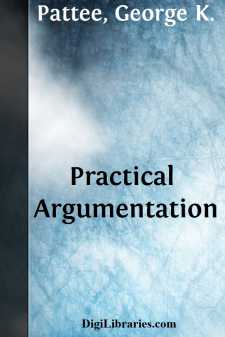Categories
- Antiques & Collectibles 13
- Architecture 36
- Art 48
- Bibles 22
- Biography & Autobiography 813
- Body, Mind & Spirit 142
- Business & Economics 28
- Children's Books 15
- Children's Fiction 12
- Computers 4
- Cooking 94
- Crafts & Hobbies 4
- Drama 346
- Education 46
- Family & Relationships 57
- Fiction 11828
- Games 19
- Gardening 17
- Health & Fitness 34
- History 1377
- House & Home 1
- Humor 147
- Juvenile Fiction 1873
- Juvenile Nonfiction 202
- Language Arts & Disciplines 88
- Law 16
- Literary Collections 686
- Literary Criticism 179
- Mathematics 13
- Medical 41
- Music 40
- Nature 179
- Non-Classifiable 1768
- Performing Arts 7
- Periodicals 1453
- Philosophy 64
- Photography 2
- Poetry 896
- Political Science 203
- Psychology 42
- Reference 154
- Religion 513
- Science 126
- Self-Help 84
- Social Science 81
- Sports & Recreation 34
- Study Aids 3
- Technology & Engineering 59
- Transportation 23
- Travel 463
- True Crime 29
Practical Argumentation
by: George K. Pattee
Description:
Excerpt
CHAPTER I
PRELIMINARIES
Argumentation is the art of presenting truth so that others will accept it and act in accordance with it. Debate is a special form of argumentation: it is oral argumentation carried on by opposing sides.
A consideration of the service which argumentation performs shows that it is one of the noblest and most useful of arts. By argumentation men overthrow error and discover truth. Courts of law, deliberative assemblies, and all bodies of people that engage in discussion recognize this fact. Argumentation threshes out a problem until the chaff has blown away, when it is easy to see just what kernels of truth remain and what action ought to be taken. Men of affairs, before entering upon any great enterprise, call in advocates of different systems, and by becoming familiar with arguments from every point of view try to discover what is best. This method of procedure presupposes a difference of opinion and belief among men, and holds that when each one tries to establish his ideas, the truth will remain, and that which is false will be swept away.
The field of argumentation includes every kind of discourse that attempts to change man's actions or opinions. Exposition is explanation when only one theory or one interpretation of the facts is possible; when views of truth or of policy conflict, and one course is expounded in opposition to another, the process becomes argumentation. This art is used not only by professional speakers, but by men of every occupation. The schoolboy pleading for a holiday, the workman seeking employment, the statesman advocating a principle of government are all engaged in some form of argumentation. Everywhere that men meet together, on the street or in the assembly hall, debate is certain to arise. Written argument is no less common. Hardly a periodical is published but contains argumentative writing. The fiery editorial that urges voters to the polls, the calm and polished essay that points out the dangers of organized labor, the scientific treatise that demonstrates the practicability of a sea-level canal on the Isthmus are attempts to change existing conditions and ideas, and thus come within the field of argumentation.
The practical benefit to be derived from the study and application of the principles of argumentation can hardly be overestimated. The man who wishes to influence the opinions and actions of others, who wishes to become a leader of men in however great or however humble a sphere, must be familiar with this art. The editor, the lawyer, the merchant, the contractor, the laborer—men in every walk of life—depend for their success upon bringing others to believe, in certain instances, as they believe. Everywhere men who can point out what is right and best, and can bring others to see it and act upon it, win the day. Another benefit to be obtained from the study of argumentation is the ability to be convinced intelligently. The good arguer is not likely to be carried away by specious arguments or fallacious reasoning....


